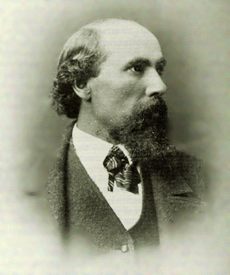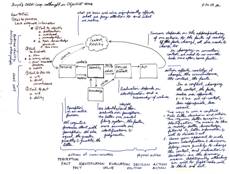
The Spirit of Transportation, by Karl Bitter, 1895
Business
Leadership and Management
- Managing Oneself by . This coscisely describes the essential aspects of one's career skils that one must manage and capitalize on, and gives the tools for doing so.
- High Output Management by Andrew S. Grove. The past president of Intel, regarded by many as the consumate manager, describes inductively an entire conceptual framework for management of any enterprise, but particularly addressed to the middle levels of management charged with integration and implementation.
- The Goal, A Process of Ongoing Improvement by . In this book, cast in the form of a story, Goldratt guides his reader to learn the "Theory of Constraints," the idea that every process is limited by one critical bottleneck or weak point. When that is unclogged, but only when, then the whole process jumps in efficiency.
- The 7 Habits of Highly Effective People by . In this classic book, Covey provides an intermediate process between the virtues identified by Objectivism and the daily practices and habits that keep values and virtues formost in one's mind and guiding one's actions. He first argues that only action based on rational principles can achieve long-lasting success and happiness, then adds six principles for putting virtue into practice.
- Pleased But Not Satisfied by . A thoughtful engineer who led several of the leading companies within Berkshire Hathaway before leaving and founding Teton Capital, Sokol condensed the essentials of rational business management into a short book emphasizing fundamental principles and respect for reality. Chapters include: Core Principles, Goal Setting and Budgeting, the Plan-Execute-Measure-Correct loop, Acquisitions and Business Expansion, Individual Improvement, and Balance in Business and Personal Life. He concludes with the advice to "get the basics right, and success will follow." (out-of-print, see sources.)
- Only the Paranoid Survive, How to Exploit the Crisis Points That Challenge Every Company by Andrew S. Grove. At a strategic inflection point, one of the fundamental forces in one's context has changed by a large, e.g. 10x or more, amount. This upsets the whole basis of all prior planning. Existing experience is obsoleted. It alters radically the context in which thinking, planning, and acting need to occur. You need to think and plan anew. Only the Paranoid Survive describes how to look for, recognize, and exploit strategic inflection points.
- Great by Choice, Uncertainty, Chaos, and Luck--Why Some Thrive Despite Them All by . Great companies that thrive during danger and chaos do so because they behave differently than others. Collins and Hansen compare paired sets of companies across a range of industries, all of which faced uncertainty and chaos, to identify the factors that differentiate the successful. They induce principles for thriving on chaos, principles that are valuable for everyone and every enterprise.
- The Effective Executive, The Definitive Guide to Getting the Right Things Done by . identifies the principles for effective decision-making and action. Equally applicable to a whole life as well as business specifically, an effective executive concentrates his time and energy on the most important opportunities that will have decisive consequences and makes that concentration into a conscious habit.
- The Essence of Leadership, The Four Keys to Leading Successfully. Dr. Locke examines examples of effective leaders across a range of industries and time periods, identifying a model of what leadership consists of and the four key elements that a successful leader must possess.
- The Checklist Manifesto, How to Get Things Right by . Checklists allow one to manage complexity and cognitive overload. Gawande shows, first, that checklists are the means, during complex situations, to consistently apply the knowledge that is available in our minds but that we might forget to use. Second, checklists permit us to manage the assembly and integration of knowledge that is held by different members of an enterprise when facing a complex situation.
- The New Rational Manager by . Problem-solving and decision techniques, focussing on the human side of change and improvement.
- The Logic of Failure, Recognizing and Avoiding Error in Complex Situations by . Explains why people make dumb mistakes, how you can recognize one blooming and how you can think your way out.
- Certain to Win by . John Boyd proposed a theory of military strategy that has revolutionized warfare by placing an emphasis on the cognitive aspects of conflict, especially on the roles of values and epistemology (though he uses an odd vocabulary of his own, and can be maddingly unclear). This theory is for the first time applied to winning and losing more broadly, outside the specifically military.
Business Biography
- The Prime Movers, Traits of the Great Wealth Creators by Edwin A. Locke. What specific actions do the great weath creators take? What ideas, attitudes and abilities characterize the business giants who create new businesses, new products and new wealth? This book identifies the answers and provides guidelines for any prospective business leader or investor.
- The Entrepreneurs, An American Adventure by . The story of entrepreneurs in the United States, from its beginnings to the present day, told largely by numerous segments on individuals and the businesses they created. Also available as a video series.
- The Myth of the Robber Barons by . Capsule biographies of key industrialists of the 19th century, the most capitalistic period in American history: Vanderbilt, Hill, Scranton, Schwab, Rockefeller, and Mellon.
- The Financial Crisis and the Free Market Cure, Why Pure Capitalism is the World Economy’s Only Hope.
John Allison gives a uniquely from-the-inside look at the recent financial crisis and shows that the cause was government manipulation of the economy, which provided strong incentives for irrational behavior, coupled with government regulation, which obstructed rational thought and action.
Examples pile up: the Federal Reserve caused a housing bubble through artificially low interest rates; Fannie Mae and Freddy Mac drove Savings and Loan Associations out of the mortgage market then made massive quantities of loans to people who could not afford them and which could never be repaid; the SEC forced banks to shrink their reserves against bad loans; FDIC insurance and the Fed’s low interest rates lulled depositors and investors alike into neglecting the soundness of banks; government-sanctioned rating agencies inflated the grades of mortgage-backed securities; erratic bailouts of crony-favored institutions like Countrywide, Washington Mutual, General Motors, and General Electric destroyed the rule of law and drove the panic deeper.
But Allison does more than identify that the root financial cause of the crash was government intervention in the economy. He names the political ideas and specific steps necessary to effect a cure: full laissez-faire capitalism, starting with deregulation, disengagement, and sound money.
Allison then — in what are my favorite chapters in the book — describes the moral values and virtues that each of us can practice to make our lives rational, productive, confident, and happy.
The Financial Crisis and the Free Market Cure is a diagnosis and prescription for moving off the road to ruin and back to the vision America was founded on, a path of prosperity and personal happiness.
- The First Tycoon, The Epic Life of Cornelius Vanderbilt by . Cornelius Vanderbilt was the first modern capitalist in the United States. Stiles give a heroic account of Vanderbilt, showing in detail how his achievements flowed from his character, and sets Vanderbilt's actions into the broader context of the growth of America from the Presidency of George Washington through the transformation of the United States into the world's leading industrial power, a growth carried out in large measure by Cornelius Vanderbilt. Vanderbilt, from a beginning in shipping in New York, established the most efficient transportation line to the gold fields of California, personally pioneered a course across the Isthmus of Nicaragua, financed a war to prevent American slave-holding southerners from expanding slavery into Nicaragua, contributed substantially to the Union victory over the Confederacy, and built the most efficient and least expensive railroad line in America. Vanderbilt invented much of the modern corporation and modern finance, and thus was the man, above all others, who pioneered the transformation of industry away from both aristocratic monopolies and small-scale private manufacture into privately-owned, large-scale, integrated enterprises. Vanderbilt did all this with singular, selfish attention to his goals, asking only to be left unmolested by royalty and governments, and serves as an inspiring example of productive character and how much is possible when creativity and private property is left free to act.
- The Abolition of Antitrust by . The Abolition of Antitrust asserts that antitrust laws- on economic, legal, and moral grounds- are bad, and provides convincing evidence supporting argument for their total abolition. Every year, new antitrust prosecutions arise in the U.S. courts, as in the cases against 3M and Visa/MasterCard, as well as a number of ongoing antitrust cases, such as those involving Microsoft and college football's use of the Bowl Championship Series (BCS). Gary Hull and the contributing authors show that there cases- as well as the Sherman Antitrust Act itself- are based on an erroneous interpretation of the history of American business, premised on bad economics. They equivocate between economic and political power- the power to produce versus the power to use physical force. For Hull, antitrust prosecutions are based on a horrible moral inversion: that it is acceptable to sacrifice America's best producers.-- Publisher
- My Years with General Motors. "I think Alfred Sloan's My Years with General Motors is probably the best book to read if you want to read only one book about business. The issues [Sloan] dealt with in organizing and measuring, in keeping [other executives] happy, dealing with risk, understanding model years and the effect of used vehicles, and modeling his competition all in a very rational, postive way is inspiring." --Bill Gates, Chairman, Microsoft
- American Steel, Hot Metal Men and the Resurrection of the Rust Belt by . Ken Iverson's Nucor moves at a fast and innovative pace against an industry rusting under tradition and union work rules. Smart people invent, take calculated risks, make decisions, make steel and make money.
- The Microsoft Way, The Real Story of How the Company Outsmarts its Competition by . Stross blows away the fantasies promoted by Microsoft's enemies and identifies the real reasons that Microsoft succeeds: Rational, clear-thinking, intelligent, hard-working people, freedom, innovation, a grasp of the total market, an integration of short and long-term action and a relentless emphasis on profits.
- Comeback, How Seven Straight-Shooting CEOs Turned Around Troubled Companies by . The crucial role of the CEO illustrated in the most trying of circumstances.
Investment
- Investing: An Objective Approach by . This recorded lecture covers the basics of long-term investing for those who have careers outside the markets.
- Investment Illusions, A Savvy Wall Street pro explodes popular misconceptions about the markets by .
- Probable Outcomes by . Investment climates are not uniform but nor are they random. Financial history contains periods, from a few years in duration to decades, of marketdly different character. During periods of one character, most stocks perform well above their long term average; during the opposite type of periods stocks perform poorly or even lose substantially. Easterling identifies the principal causes of the differences, describes how to recognize current conditions, and identifies what investment returns are likely over the next decades. Easterling primarily identifies causes as financial, such as interest rates and divident yields. He would have a richer analysis if he expanded it to recognize other political factors such as the degree and trend of government regulation and respect for (or lack of) property rights generally.
- Sustainable Wealth by . Financial planning requires recognizing which factors we have more control over (e.g. our spending rate) versus less (e.g. the amount and pattern of our income) and adjusting both our plans and our investments to bring more under our control.
- Keep What You Earn, Practical Strategies to Protect Your Assets from Taxes, Lawsuits and Financial Predators by . You earned it. It's yours. Now learn how to keep it.
- Wealth: An Owners Manual, A Sensible, Steady, Sure Course to Becoming and Staying Rich by . Good advice on how to benefit from your wealth once you have it. While I don't agree with all of the particulars advanced by the author, his overall approach is sound and advisable.
- A Gift to My Children, A Father's Lessons for Life and Investing by . The famed investor Jim Rogers concisely gives his advice for growing and living well.
- Market Wizards, Interviews with top traders by . Interviews revealing the traits and approaches of traders, those who buy and sell assets over relatively short time spans.
- Common Stocks and Uncommon Profits by . History and advice from a master of selecting stocks for their fundamental value.
Selling
- The Win Without Pitching Manifesto by . Aimed at creative professionals in advertising and design, the ideas in this book are actually relevant to all creative people, all those whose income derives from their ability to comprehend a problem and invent a solution. All such need a strategy to demonstrate their exceptional, preferably unique, value, avoiding being substitutable commodities.
- Lead, Sell, or Get Out of the Way, The 7 Traits of Great Sellers by . Effective selling is not a matter of manipulating or overwhelming a prospective buyer. Rather, it is a rational process of specializing in a domain, differentiating onesself from competitors, communicating the fact of one's expertise, learning the needs of potential customers, and, if there is a match, helping customers make and sustain the decision that is in their best interest.
See Also
- Economics – The study of production and trade.
- Thinking Skills – Techniques for improving your cognitive and problem-solving skills
Links
- Capitalism.org – Web site promoting Objectivism and laissez-faire capitalism.
-
Ingenuism
– Ingenuism is a new economic framework which holds that progress derives from ingenuity supported by the core principles of connection, exploration, and environment.
- Connection is the ability for people to observe and learn from other people’s ideas and insights, and to collaborate in ways that generate better ideas and insights.
- Exploration is our ability to test out ideas and engage in trial-and-error learning.
- Environment is a culture (and legal framework) that not only allows for but encourages exploration, connection, and iterative learning.
- Microsoft Myths – Analysis of random claims against Microsoft
copyright © 2024 Andrew Layman, all rights reserved, 1/15/2024 6:10:28 PM, Topic: Business, http://www.strongbrains.com



